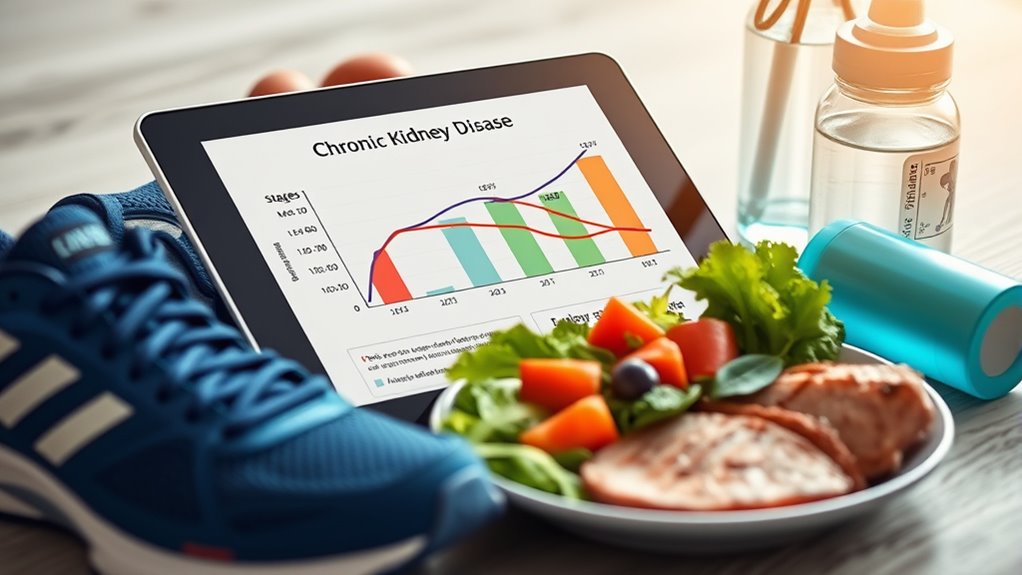Understanding your GFR helps you track CKD stages and guides necessary lifestyle changes. In early stages, focus on preventing progression by controlling blood pressure and maintaining a healthy diet. As the disease advances, manage symptoms, stay active, and prepare for possible treatments like dialysis. Throughout, adopting kidney-friendly habits and seeking support can improve your quality of life. Explore further to discover tailored strategies for each stage and how to better manage your condition.
Key Takeaways
- GFR levels classify CKD into stages 1 through 5, indicating disease severity and progression.
- Monitoring GFR helps tailor lifestyle changes to slow CKD advancement at each stage.
- Early stages focus on prevention and controlling risk factors like hypertension and diabetes.
- Advanced stages require intensified lifestyle modifications, including diet adjustments and preparation for dialysis.
- Consistent GFR assessment and lifestyle management are essential for preserving kidney function and quality of life.
Understanding GFR and Its Role in CKD Progression
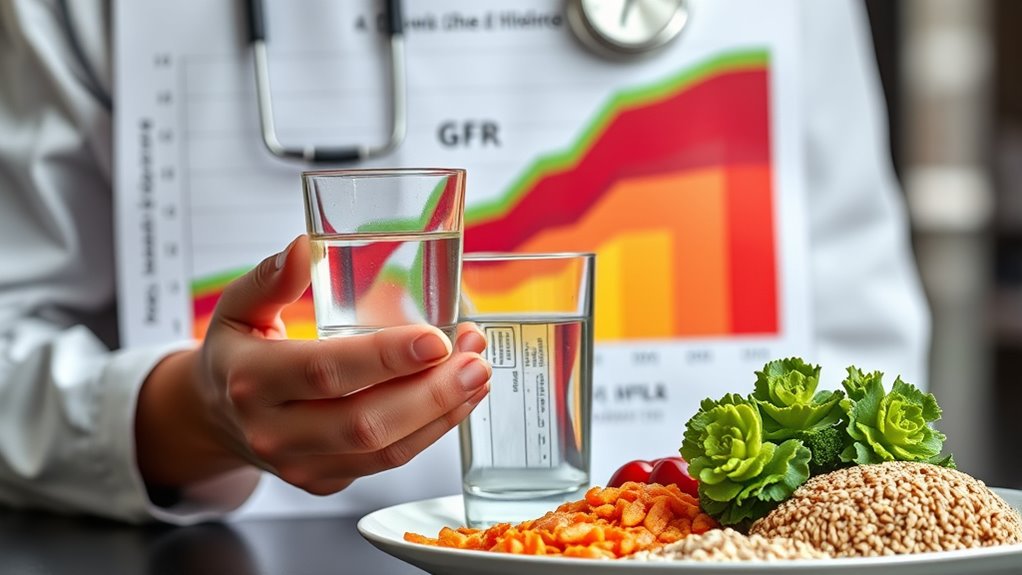
Glomerular filtration rate (GFR) is a key measure of kidney function that indicates how well your kidneys are filtering waste from your blood. When your GFR measurement is normal, it means your kidneys are effectively removing toxins and maintaining fluid balance. As CKD progresses, your GFR decreases, signaling reduced kidney function. Monitoring GFR helps healthcare providers assess the stage of your kidney disease and track its progression. A low GFR suggests that your kidneys aren’t filtering properly, which can lead to waste buildup and other health complications. Understanding your GFR is essential for managing CKD, as it provides clear insight into your kidney health. Regular GFR measurement allows early detection of decline, enabling timely interventions to slow disease progression. Accurate GFR assessment is crucial for tailoring appropriate treatment plans and lifestyle adjustments.
Stage 1 CKD: Recognizing Early Signs and Making Preventative Changes
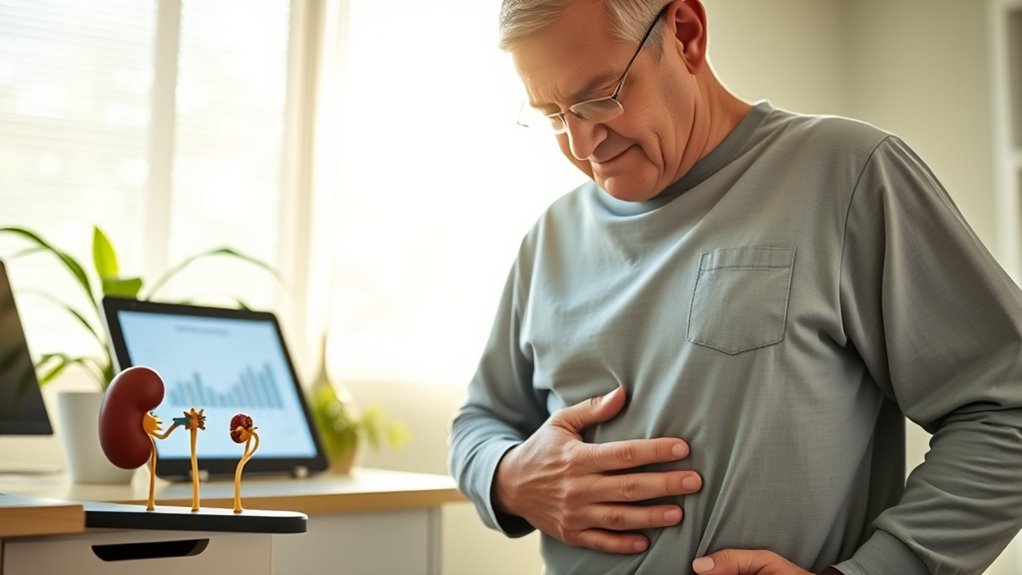
Early signs of Stage 1 CKD can be subtle or even absent, making it important to stay vigilant about your kidney health, especially if you have risk factors like high blood pressure or diabetes. Early detection plays a vital role in managing the condition effectively. Regular check-ups and blood tests can identify kidney issues before noticeable symptoms appear. Once diagnosed, you can take preventative measures to slow disease progression, such as controlling blood pressure, managing blood sugar, and adopting a kidney-friendly diet. Staying informed and proactive helps you maintain kidney function longer and reduces the risk of advancing to more severe stages. Remember, early intervention is key to preserving your kidney health and overall well-being. Incorporating regular monitoring of your kidney function can further enhance early detection efforts.
Stage 2 and 3 CKD: Managing Symptoms and Slowing Disease Advancement
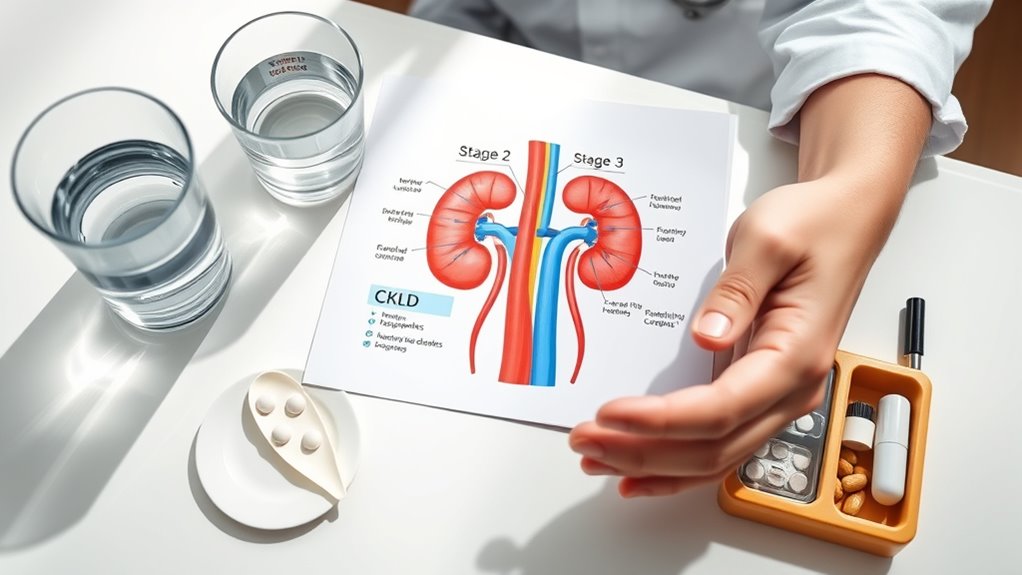
As kidney function declines from Stage 2 into Stage 3, symptoms may become more noticeable, and managing these changes becomes increasingly significant. To slow disease progression, focus on a balanced diet, and consider dietary supplements like omega-3 fatty acids or vitamin D, after consulting your doctor. These supplements may support kidney health and reduce inflammation. Additionally, incorporating sound healing science techniques such as listening to calming music has been shown to promote relaxation and reduce stress, which can benefit overall kidney health. Alternative therapies, such as acupuncture or herbal remedies, can also help manage symptoms like fatigue or swelling, but always discuss these options with your healthcare provider to guarantee safety. Maintaining a healthy lifestyle by controlling blood pressure and blood sugar, staying active, and avoiding nephrotoxic substances is vital. Incorporating supportive therapies can further enhance symptom management. Engaging in evidence-based approaches like guided meditation or yoga may also contribute to stress reduction and improve overall well-being. By actively managing symptoms and exploring supportive therapies, you can help slow the progression of CKD and improve your quality of life.
Stage 4 CKD: Preparing for Potential Dialysis and Intensifying Lifestyle Modifications
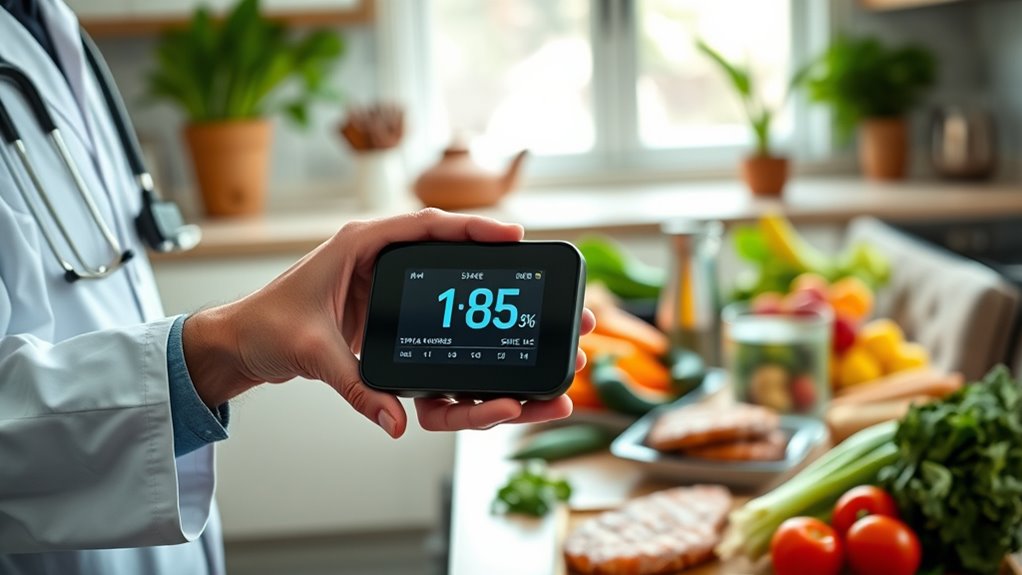
When your kidney function drops to Stage 4, it’s crucial to start preparing for potential dialysis and make more intensive lifestyle changes. You should discuss options like renal transplantation early, as it can considerably improve quality of life. Meanwhile, adopt a kidney-friendly diet, control blood pressure, and manage blood sugar levels to slow further decline. Regular communication with your healthcare team helps you plan for the transition, ensuring you’re ready if dialysis becomes necessary. If you’re not a candidate for transplantation, palliative care options can help manage symptoms and maintain comfort. Staying proactive now allows you to make informed decisions, reduce complications, and maintain your well-being as your kidney function continues to decline. Incorporating Volkswagen Tuning techniques can serve as a helpful analogy for fine-tuning your health management strategies during this critical stage. Additionally, understanding the importance of inspirational quotes about fatherhood can provide emotional support and motivation throughout this journey. Being aware of AI in Education innovations can also inspire new approaches to managing your health and staying engaged in your care plan.
Stage 5 CKD (End-Stage): Treatment Options and Support Strategies
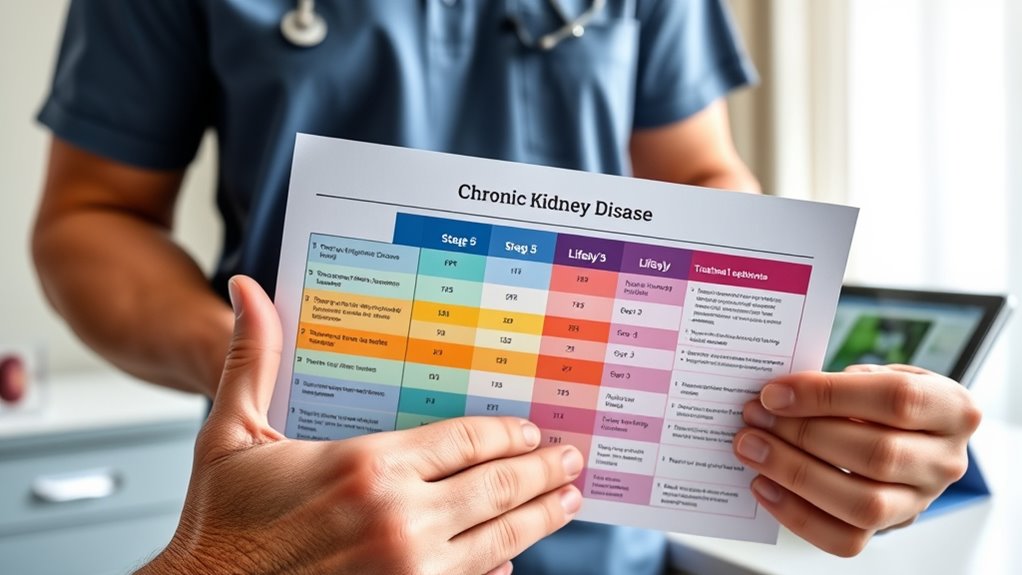
At stage 5 CKD, you’ll need to contemplate your treatment options, including dialysis or a kidney transplant. It’s also important to explore the support resources available to help you manage this stage effectively. Understanding these choices can empower you to make informed decisions about your care. Considering cost management options can also play a role in managing associated costs and accessing necessary supplies. Additionally, being aware of the divorce process in your state can be helpful if you need to coordinate care and financial planning with your family or partner.
Dialysis Treatment Options
For individuals with Stage 5 CKD, also known as end-stage kidney disease, dialysis becomes an essential treatment option to perform the kidney functions that your body can no longer handle on its own. Dialysis helps remove waste, excess fluids, and toxins from your blood, supporting your overall health. You may explore different types of dialysis, such as hemodialysis or peritoneal dialysis, depending on your lifestyle and medical advice. While some people consider home remedies or alternative therapies, it’s important to remember that these aren’t substitutes for dialysis but can complement your treatment plan. Always discuss any complementary approaches with your healthcare team to ensure they’re safe and effective for your specific condition. Proper management can improve your quality of life during this stage. Additionally, understanding your kidney function and how it influences your treatment choices can help you better navigate this challenging phase. Knowing your appliance options, such as dialysis machines and related equipment, can also assist in making informed decisions about your care. Regular monitoring of your lab results is crucial to adjust your treatment plan effectively and prevent further complications.
Support System Resources
Navigating stage 5 CKD can feel overwhelming, but having a strong support system makes a significant difference. Emotional support from family, friends, or support groups helps you cope with the stress and uncertainty. Community resources, such as local clinics and patient advocacy organizations, provide valuable information and assistance. Connecting with others facing similar challenges reduces feelings of isolation. These resources can also guide you through treatment options like dialysis or transplantation. Building a reliable support network ensures you don’t face this journey alone and can maintain your mental well-being. Additionally, staying informed about medical advancements in CKD treatment can help you make better decisions about your care. Developing a comprehensive care plan tailored to your needs can further improve your quality of life and disease management. Engaging with personalized care strategies can empower you to take an active role in managing your condition and improve overall well-being.
Practical Lifestyle Changes for All CKD Stages

Making simple lifestyle changes can substantially impact your CKD management. Focusing on dietary modifications, staying active with regular exercise, and managing medications help slow disease progression. These practical steps empower you to take control of your health at any stage. Incorporating healthy snack options like fruits and nuts can also support your overall well-being.
Dietary Modifications
Adopting specific dietary modifications can considerably slow the progression of CKD and improve your quality of life across all stages. Proper nutritional planning and meal planning help control intake of sodium, protein, potassium, and phosphorus, reducing strain on your kidneys. By adjusting your diet, you can better manage symptoms and prevent complications. Focus on balancing your meals with kidney-friendly foods and avoiding those that may cause harm. Consistent monitoring and tailored dietary choices make a significant difference. To get started, consider these strategies:
- Limit processed and high-sodium foods
- Choose fresh fruits and vegetables low in potassium
- Opt for lean protein sources in moderation
- Use herbs and spices instead of salt to flavor meals
- Maintaining a healthy lifestyle supports overall kidney health and complements dietary efforts.
- Staying aware of GFR levels helps track your kidney function and guides dietary adjustments.
- Being mindful of symptoms of CKD can help you recognize early signs of progression and seek timely medical advice.
Regular Exercise Routine
Have you considered how incorporating regular exercise into your routine can benefit your kidneys and overall health? Staying active improves circulation, helps maintain a healthy weight, and reduces stress. Exercise also encourages better hydration habits, which support kidney function. However, choose activities suited to your CKD stage and avoid overexertion. Incorporate gentle options like walking or stretching, and listen to your body. To stay safe, balance activity with proper hydration and rest. Regular movement not only boosts physical health but also helps reduce stress, which is crucial for managing CKD. Here’s a simple guide:
| Exercise Type | Benefits | Tips |
|---|---|---|
| Walking | Improves circulation | Stay hydrated and moderate intensity |
| Stretching | Enhances flexibility | Do gently and regularly |
| Yoga | Stress reduction, flexibility | Avoid poses that strain kidneys |
Medication Management
Managing your medications effectively is essential for slowing CKD progression and avoiding complications. Staying consistent with medication adherence ensures your treatment works as intended. It’s important to understand potential side effects and communicate any issues to your healthcare provider promptly. Proper medication management helps prevent further kidney damage and manages symptoms. To optimize your regimen, consider these tips:
- Take medications exactly as prescribed, at the right times
- Keep a list of all medicines and share it with your doctor regularly
- Watch for side effects like dizziness or swelling and report them immediately
- Use pill organizers to prevent missed doses
Frequently Asked Questions
How Does Age Affect GFR and CKD Risk?
Aging effects cause a natural GFR decline, increasing your risk of CKD as you get older. As you age, your kidneys may not filter blood as efficiently, which can lead to higher chances of developing kidney issues. You should stay aware of these changes and monitor your kidney health regularly. Maintaining a healthy lifestyle, controlling blood pressure, and staying active can help slow GFR decline and reduce your CKD risk.
Can Diet Alone Reverse Early CKD Stages?
You wonder if diet alone can reverse early CKD stages. While diet modification and nutritional therapy play essential roles in managing the disease, they can’t typically reverse it entirely. Proper nutrition helps slow kidney damage and control symptoms, but you may need additional treatments. Focusing on a balanced diet, reducing salt, and managing blood sugar and blood pressure are key steps, yet medical supervision remains necessary for best care.
What Are Non-Dietary Lifestyle Changes to Slow CKD?
Fostering fitness and reducing risk are key to slowing CKD. You should prioritize regular exercise to boost your overall health and maintain kidney function. Managing stress through relaxation techniques helps prevent additional strain. Staying motivated can be tricky, but setting small goals keeps you on track. Combining consistent activity and stress management not only supports your kidneys but also promotes a healthier, happier life.
How Do Medications Impact CKD Progression?
Medications can slow CKD progression by controlling blood pressure and reducing proteinuria, but you should watch out for medication side effects and drug interactions. Some drugs may harm your kidneys or cause unwanted effects, so your doctor carefully monitors your treatment. Staying informed and reporting any new symptoms helps ensure your medications work effectively while minimizing risks, ultimately helping you manage your CKD more effectively.
Are There Alternative Therapies to Dialysis for Late-Stage CKD?
Imagine a future where you’re free from the machines that seem to dominate late-stage CKD. Alternative treatments like herbal remedies offer hope, but they’re not guaranteed solutions. While some believe in natural therapies, scientific evidence remains limited. You must weigh these options carefully, consulting your healthcare provider. Stay curious and cautious—these therapies might hold promise, but they shouldn’t replace proven dialysis methods without professional guidance.
Conclusion
Think of your kidneys as a delicate garden that needs care. As the stages of CKD unfold, your role becomes that of a vigilant gardener, tending to the soil with mindful habits. By understanding GFR and making proactive lifestyle changes, you can nurture your garden through every season. Remember, with consistent effort and awareness, you can help your kidneys thrive, even as they face the challenges of each stage.
